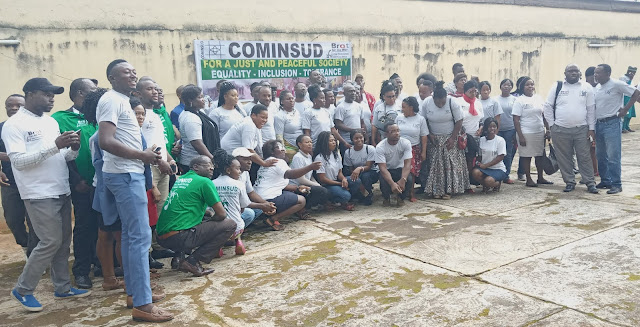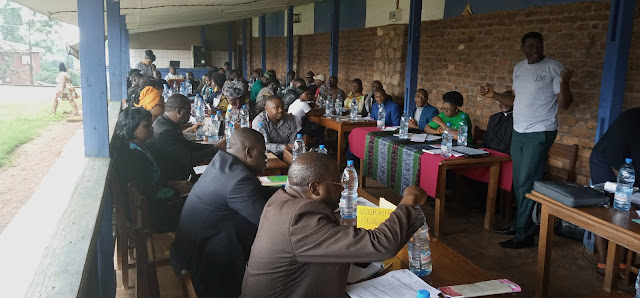Day by day, more and more civil society organisations have continued to join the Cameroon government and international bodies in attempting a way out of the current socio-political stalemate crushing the two English speaking regions of Cameroon dubbed the Anglophone Crisis.
It is in this light that a one day workshop for media practitioners on strategies and approaches in promoting attitude change towards positive thinking, tolerance and non violence was recently organised in Bamenda on Thursday October 17th 2019 by COMINSUD, Community Initiative for Sustainable Development, an organisation committed to inspiring changes within communities that leads to enhancement of quality life for people. Its activities are focused on promoting good governance, a culture of peace, empowering of women, youths and marginalised communities and engaging in humanitarian works in the present sociopolitical context among others.
 |
| Participants pose for a family photo am |
Participants weren't media practitioners only but included religious, educational, legal, socio-cultural and civil society organisations alongside youths and community leaders drawn from almost all the various tribes and villages that make up the entire N.W region like Wimbum, Aghem, Nso, Meta, Mankon, Fundong, Ndop, Bali, Santa, Bafut, Njinikom, Batibo etc.
Welcoming the over a hundred participants at the workshop that took place on the campus of the Catholic University of Cameroon, CATUC Bamenda, the COMINSUD BOD chair, Madam Tchambie Julie said "In the backdrop of what has today become known as the Anglophone Crisis, response by actors hasn't made things better reason why COMINSUD came up with this project to promote attitude and behaviour change, moving from a society with growing negativity, intolerance and violence to a society that promotes the values of positivity, tolerance and non violence"
 |
| Journalists pose for pic |
The coordinator of COMINSUD, Mr. Fon Nsoh on his own part while presenting a summary report from reflections on negativity and intolerance revealed that COMINSUD is a partner of the Civil Peace Society (CPS) network in Cameroon which is a vast program of the German government operating in several countries across the world for the promotion of the values of peace. To him, conflicts will always exist but managing them not to turn violent should be prioritised. Until the advent of the Anglophone crisis, the NW region was said to be a bastion for inter tribal conflicts with some of the prominent ones that made news being Bali-Bawock, Oku-Mbessa, Bali Kumbat-Bafanji, all of which resulted to destruction of houses and farms and killing of animals and humans, this because of inequality, intolerance and non-inclusion.
Conflicts are caused by negativity, a tendency or inside feeling that makes one to be skeptical and pessimistic towards ideas, views and other's opinions. Extreme negativity pushes people to undesirable actions like violence. However, facts, figures and statistics have remained strong weapons to fight violence and intolerance including dialogue, negotiation and compromise.
 |
| Working session |
Mr. Mbanwi Stephen, a participant representing the Meta Cultural and Development Association (MECUDA) told the workshop organiser "I'm so pleased with the workshop. I've seen the richness of it" Mr. Ndangam Hussein, a community volunteer for Fundong on his part narrated his experience with restoration forces he came across and how he used dialogue, tolerance and negotiation to free himself from their hands. Jeff Ngawe, a reporter with The Reporter Newspaper recounted how in the yesteryears precisely the 60s and 70s they never knew of inter tribal, religious, cultural and even regional division till university when they started witnessing anglophone marginalisation in the University of Yaounde 1. From thence he developed a radical mind but thanks to the many peace workshops he's been attending, he's now able to tolerate as his mind has been softened.
 |
| COMINSUD Banner |
Participants at the end of the workshop returned home with a call on them to step up non violent communication methods to pressure for change through creative writing, music, football, drama, debates, radio reports, special prresentstions/write ups and other intellectual exercises.

No comments:
Post a Comment